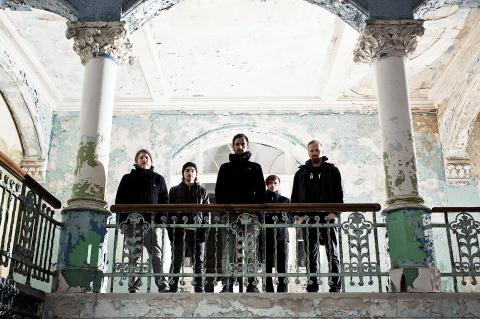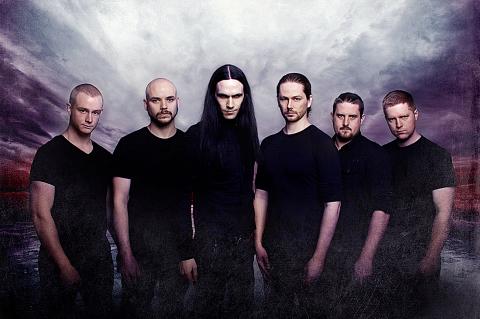How much are you willing to suffer for your art? Some so-called artists or musicians are dedicated to the cause only until they are truly tested. As soon as things get tough, they throw their hands up, say things just didn’t swing their way and scurry back to the mundane monotonies of the everyday.
Not Melbourne, Australia’s Ne Obliviscaris. The melodic/progressive metal band, fronted by harsh vocalist Xenoyr, has gone over every hurdle a band could possibly encounter in the course of its ten-year existence. A continuous spate of lineup changes early on which saw only Xenoyr and violinist/clean vocalist Tim Charles remain would have been enough to shatter even the most idealistic of artists. But for Xenoyr, also known as Marc Campbell, giving in was never a notion to be even remotely considered. It’s about more than music. It’s about living with true purpose.
“Living and doing something without real meaning to you is completely pointless,” he says. “Your existence is pointless.”

Photo courtesy of Metal Blade Records
The struggle to persevere has been anything but pointless for the Antipodean six-piece. Nine years after the band’s formation, Ne Obliviscaris, a name which means “forget not,” finally released its debut album in 2012. Titled Portal Of I, the record’s combination of melancholia, melody, progressive tendencies and extremity put it firmly on many a critic’s “Best of” list last year. It was an affirmation that the band hadn’t been frittering away its time in the preceding nine years, says Campbell.
“We knew the album was good to a degree, but to get such great reviews was quite overwhelming, and I guess that kind of reaffirmed that we weren’t wasting our time.”
Despite the accolades Portal Of I has won, there was a time when the album was dangerously close to not happening. Though five of the six members of Ne Obliviscaris are Aussies, lead guitarist Benjamin Baret hails from France. After the band’s original lead guitarist quit, Baret moved to Australia in 2009 to rehearse and play with the band, only to be sent back to his homeland when his application for a “Distinguished Talent” visa was rejected. These were dark times for certain members, Campbell recalls.

Photo courtesy of Ne Obliviscaris
“The whole immigration saga took a heavy toll on the band, and calling it a day was considered by some if it fell through.”
But Baret would eventually be granted his visa on appeal, and Ne Obliviscaris has been going strong ever since, touring the world and finally embracing a future without so many dark clouds looming on the horizon. At one time, releasing Portal of I was as far ahead as the band could see. Now, there are infinite possibilities, says Campbell.
“Obviously we had to release the album but anything further than that seemed uncertain. But here we are today, solid and moving towards the future with open arms.”
Ne Obliviscaris — with support from Bloody Tyrant (暴君) and Until Seeing Whale’s Eyes (直到看見鯨魚的眼睛) — plays tonight at The Wall (這牆), B1, 200, Roosevelt Rd Sec 4, Taipei City (台北市羅斯福路四段200號B1). Doors open at 7:30pm, and the show starts at 8:00pm. Tickets are NT$1,200 at the door. A combo package which includes a ticket for Sunday night’s gig featuring The Ocean is available for NT$1,800.
■ The weekend of progressive metal continues on Sunday night at The Wall when The Ocean comes to town.
The aqua-centric band hailing from Berlin was founded by guitarist Robin Staps as an open collective of musicians in 2000, and has seen somewhere around 50 musicians pass through its ranks. Since 2009, however, the lineup has remained stable, more or less, and that number has been whittled down to a far more manageable figure of six.
The music of The Ocean is as vast as its name would imply. For evidence one needs look no further than the band’s latest album, Pelagial. The concept record, released earlier this year, takes listeners on a journey downward through the depth zones of the sea all the way to its farthest reaching trenches. The music gets heavier, darker, more temperamental and unpredictable as the depth increases. Every song comes from the mind of Staps, and even he struggles to pinpoint the source of his inspiration.
“The music I write comes from beyond,” Staps muses. “It’s impossible to say where exactly it comes from. It’s impossible to track or to locate its origin. All I know is that it is coming from inside of me. But that is a space I barely know myself.”
Staps has been through the wringer in his decade-plus at the helm of The Ocean. He’s watched musicians come and go, and even had to dismiss at least one former member of the band mid-tour. He’s also had to deal with being evicted from the band’s longtime rehearsal space, Oceanland, due to neighbor noise complaints. But Staps seems every bit the proverbial lifer when it comes to music. He realizes that for many, the harsh realities of being a touring musician are but a single chapter that will inevitably close. Still, he pushes forward.
“For most people, this life only works for a limited amount of time. I am aware of that, and am trying to make the most out of this time we have together, as long as we have it.”
The Ocean — with support from Vulner and Scattered Purgatory (破地獄) — plays Sunday night at The Wall, B1, 200, Roosevelt Rd Sec 4, Taipei City (台北市羅斯福路四段200號B1). Doors open at 7pm and the show starts at 7:30pm. Tickets are NT$1,000 in advance, NT$1,200 at the door.

April 28 to May 4 During the Japanese colonial era, a city’s “first” high school typically served Japanese students, while Taiwanese attended the “second” high school. Only in Taichung was this reversed. That’s because when Taichung First High School opened its doors on May 1, 1915 to serve Taiwanese students who were previously barred from secondary education, it was the only high school in town. Former principal Hideo Azukisawa threatened to quit when the government in 1922 attempted to transfer the “first” designation to a new local high school for Japanese students, leading to this unusual situation. Prior to the Taichung First

The Ministry of Education last month proposed a nationwide ban on mobile devices in schools, aiming to curb concerns over student phone addiction. Under the revised regulation, which will take effect in August, teachers and schools will be required to collect mobile devices — including phones, laptops and wearables devices — for safekeeping during school hours, unless they are being used for educational purposes. For Chang Fong-ching (張鳳琴), the ban will have a positive impact. “It’s a good move,” says the professor in the department of

On April 17, Chinese Nationalist Party (KMT) Chairman Eric Chu (朱立倫) launched a bold campaign to revive and revitalize the KMT base by calling for an impromptu rally at the Taipei prosecutor’s offices to protest recent arrests of KMT recall campaigners over allegations of forgery and fraud involving signatures of dead voters. The protest had no time to apply for permits and was illegal, but that played into the sense of opposition grievance at alleged weaponization of the judiciary by the Democratic Progressive Party (DPP) to “annihilate” the opposition parties. Blamed for faltering recall campaigns and faced with a KMT chair

Article 2 of the Additional Articles of the Constitution of the Republic of China (中華民國憲法增修條文) stipulates that upon a vote of no confidence in the premier, the president can dissolve the legislature within 10 days. If the legislature is dissolved, a new legislative election must be held within 60 days, and the legislators’ terms will then be reckoned from that election. Two weeks ago Taipei Mayor Chiang Wan-an (蔣萬安) of the Chinese Nationalist Party (KMT) proposed that the legislature hold a vote of no confidence in the premier and dare the president to dissolve the legislature. The legislature is currently controlled